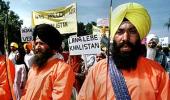 The arrest of alleged Babbar Khalsa International operative Balwinder Singh by the Federal Bureau of Investigation will help India understand the international operations of this outfit better.
The arrest of alleged Babbar Khalsa International operative Balwinder Singh by the Federal Bureau of Investigation will help India understand the international operations of this outfit better.
Indian agencies which are in touch with the FBI in connection with the case have learnt that both Babbar Khalsa International and the Khalistan Zindabad Force are operating under the same module.
Balwinder Singh, according to the information shared by the FBI, had fled India in 1997. After fleeing to the United States of America, he obtained a permanent resident card on November 30, 1997. Since then he has gone about his job very quietly, and the fact that he held an American passport only helped him travel safely both to India and Pakistan.
Since 1997 he has made nearly 11 trips to India and Pakistan, FBI inputs state.
Back in the United States he kept in touch with the major module in North America. His job was to oversee the collection of funds. A majority of the funds that he managed to collect was sent directly to Pakistan where the BKI and the KZF had taken shelter under the ISI. All these funds were used to purchase weapons, the FBI inputs received by Indian agencies point out.
While the details of Singh emerge slowly, the other aspect that India needs to be worried about is his several visits to the region. It looks very similar to arrested Pakistani American Lashkar-e-Tayiba operative David Headley -- one of the key conspirators of the 26/11 attacks in Mumbai. Even Headley used his American status to travel in and out of India with ease.
The FBI inputs also note that Balwinder Singh travelled to India and Pakistan with the help of forged documents, and he always showed that he was in India on business.
During his trips to India he visited Punjab and Indian investigators suspect that he must have met with some members of the organisation.
The money was either transacted online and at times handed over personally. Most of the transactions and phone calls he made in connection with an alleged terror conspiracy were from Reno, Nevada.
“The intercepts of these calls would clearly suggest that he was planning major strikes in India in a bid to revive Sikh militancy in Punjab”, an officer says.
India will make a formal extradition bid for Balwinder Singh once the legal formalities in the US are complete. He faces a life term if he is convicted in the US.
A team of investigators in India are preparing to fly down to the US and question him, the officer informs.
Indian investigators tell Rediff.com that Singh would be able to provide them information on the very strong Canada module as well.
“Funding has always been a headache angle in a case of terror and Singh would have the answer to this aspect,” the officer says, adding that they would like to find out the primary source of funding.
There have been instances when funds were collected from individuals. There are also cases where fake institutions claiming to be charity organisations have been set up to collect funds, the officer says.
Sources in the Intelligence Bureau also say that while Pakistani Inter Services Intelligence helped the BKI and KZF by sheltering and training them, the onus of fund raising has always been on the outfits.
“The ISI does not fund the outfits but does help channelise the funds,” the officer said.










